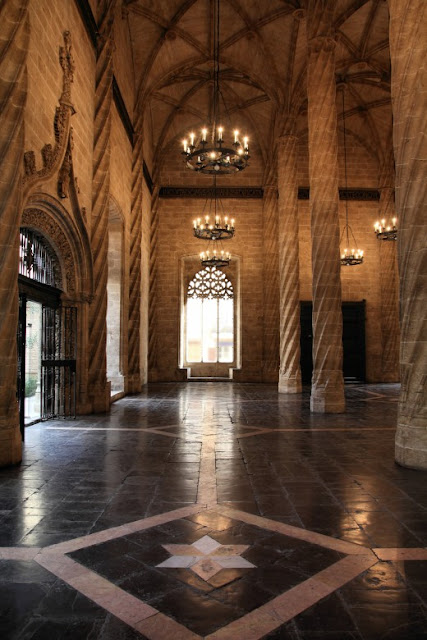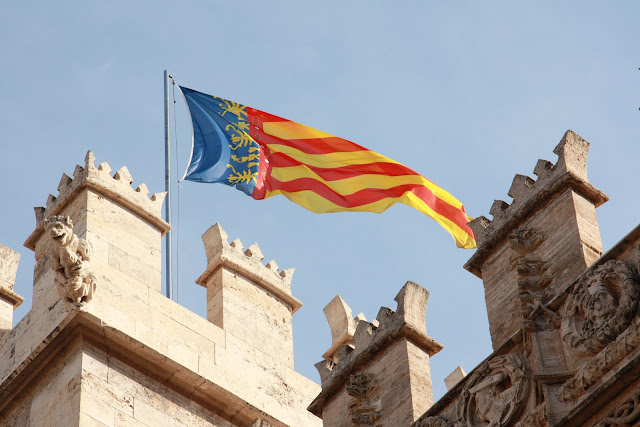Wednesday was moving day!
We checked out of our hotel, moved 3 of our humongous bags into our new apartment, even though we can not move in until next Wednesday (5/11), and moved the rest of our bags into the VRBO condo.
It is quite nice that the owner of our apartment, Eva, allowed us to leave our bags in the 3rd bedroom (the size of a babies room). It will certainly make our move a lot easier. Moving our bags around made me think that we brought way to many clothes and stuff. But we have what we have....I just like the feeling and the ease of having less stuff!
After these logistic's we deceided that we would check out the La Lonja de la Seda de Valencia (old Silk Exchange - a group of buildings).
"The Silk Market is the main monument of the city and a masterpiece of civic Gothic architecture. The building has been declared by UNESCO as part of the Humanity's Heritage. Construction on the Lonja began in 1483, a project of renowned master builder Pere Compte. Its resemblance to old Medieval castles is based on the rigid appearance of a fortress accentuated by its stone walls. The building contains four main parts, each one for a different use: the main Tower, the Consulado de Mar, the Patio de los Naranjos (Orange tree courtyard), and the Contracts Room (with many spiral columns)"
"In the Middle Ages, the city of Valencia was interested in fashion and textiles and thus developed an important silk industry. Meanwhile, the old Lonja became insufficient to meet the prosperity of the city and the construction of the Silk Exchange was required in the 15th century. This building was quickly considered as the symbol of power and wealth of the city to attract traders. Since its construction, it had been used as both a Commodity Exchange, a bank and a meeting place for merchants."
 |
| Contract room Hall of columns |
 |
| The are either carved or engraved into the ceiling beams |
 |
Lonja de la Seda - facade and decorations


|
We meet David Leventhal a Impact Assests acquaintance of Beth's in the Central Market for a traditional "second breakfast" or early lunch.
People in Spain eat 5 meals spread throughout the day. Desayuno (breakfast) usually a pastry and coffer first thing in the morning.
Then almuerzo, the 2nd breakfast or early lunch around 11:00 followed by comida (lunch) the main meal of the day taken between 14:00 and 16:00 (2pm to 4pm).
Comida is not just about eating the two hours it takes also includes the so-called sobremesa, the time spent during and after food with family or friends having a lively chat at the table.
From 16:00 to 17:00 (4pm to 5pm) is sesita time
Merienda (tea time) around 17:00 (5pm) a little snack, usually sweets and coffee.
Cena (dinner) begins around 21:00 (9pm) although most restaurants get busy around 22:00. Dinner is often smaller than lunch, like Tapas.
With David we ate a fried fish that he described was like Gefilte fish. Followed by another whole small flat fried fish, a small cooked eggplant and a "tortilla" which is not a tortilla as we know it, it's quiche. Many if not all people have either wine or beer with their 2nd lunch.
Other thoughts and experiences. We have found that the local's are very friendly and helpful. We are incredibly grateful for their attitude towards us and willingness to help us. They seem to respect and or appreciate our commitment to live in bha-LEN-cia for one year and learn Spanish. They laugh at our limited Spanish but work with us to order food, get my hair cut, find out about ordering cable and internet, etc.
I have experience, about the Spanish women the following statement, which I found on the internet:
"Spain is known for their smoking hot senoritas! They have a stunning, olive complexion that is a gift of the Mediterranean people. The tan that the Spanish acquire is immensely attractive and more so on its women. To add to their charming physical traits, Spanish ladies are endowed with beautiful raven hiar, well complemented by their dark, lustrous eyelashes. You only have to look at stars like Penelope Cruz to know the Spanish women are know the world across for their gorgeous beauty."
"Proud of their feminity"
One of the most attractive features of Spanish women is their full-sized figure which gives them a sensual appeal"
This is what I read about Spanish men:
"Spanish men are world champion hedonists and are mainly interested in five things: sex, football, food, alcohol and gambling (not necessarily in that order). Sounds a lot like American men!
How can you not like a country that the takes 2 hours lunches to hang with family and friends, in which almost everyone has either wine or beer. Most everything is closed on Sunday's, like it used to be on New Years or Christmas day. Their social life is focused on family and friends not work!















